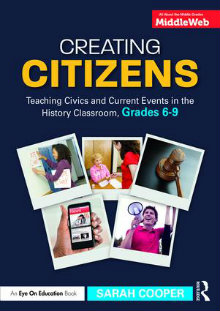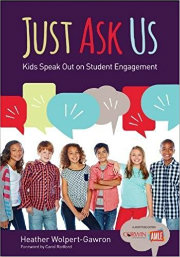Helping Students Grow into Thoughtful Citizens
Creating Citizens: Teaching Civics and Current Events in the History Classroom, Grades 6-9
By Sarah Cooper
(Routledge/MiddleWeb, 2017 – Learn more)

Talking about civics and governing these days, even among friends, can be a challenge. Now think about those tasked to teach about citizenship to a group of students from diverse political backgrounds and beliefs.
Sarah Cooper’s Creating Citizens: Teaching Civics and Current Events in the History Classroom, Grades 6-9, takes on that challenge with sensitivity and practicality. And in so doing, the book also tackles philosophies and lessons that can be used across the curriculum.

She understands the challenges of time, of getting in the many required layers of material history teachers must embed. However, she combats the predictable complaint of “not enough time” with knowledge of how to implement these vital lessons through practical strategies.
Yes, the title of this book pitches it to History and Government teachers, but my only real pushback is that Cooper’s approach can work as a template for any subject area, not just history.
I myself am an ELA teacher, and I can see using these lessons in terms of informational reading and writing and speaking. I can see Science using it as well. In fact, any class that seeks to find current evidence of how its content applies to life beyond school can benefit from this book.
After all, it is not just History teachers who are, as the author says, “on the front lines of democracy.” We all are, and we all must shoulder the responsibility of helping students see how civics and respect for the past (and each other) applies to everything we teach.
This book doesn’t just embrace History, though the examples are through that lens. This book is really about the communication of civics, of how students can learn to identify topics, evaluate them, and communicate their findings. What class can’t use those strategies?
Cooper honors another standard that is vital to both ELA and History: the Speaking standard. She insists that memorizing excerpts of key documents has a place in Civics class so that students deeply “know parts of the document for the rest of their lives.” After all, “some sources seem so important, so resonant, that simply reading and interacting with them does not seem like enough.” The ability to speak the stirring words that begin the Declaration of Independence, or the dream that Dr. King shared on the Washington Mall, is something to value always.
Practical Tools for All Content Areas
One of the resources from the book that I loved was Cooper’s Peer Response for Reformers Paper guidelines. This checklist provided guidance for students to give feedback on a peer’s essays, specifically in the area of showing evidence. I could see how to use her scaffold in my own Literary Analysis or Argument essays during our revision stations. It’s truly a cross-curricular tool.
Some of the tasks she has students looking for in their peers’ essays are as follows:
- All parenthetical citations are in correct form.
- Every fact (even if it’s paraphrased) & quotation has a parenthetical citation.
- The paper does NOT use you or I (circle these if you find them).
- Every piece of commentary relates DIRECTLY to the topic sentence.
- Every fact/quote relates DIRECTLY to the topic sentence.
- There are no run-ons (mark corrections if there are).
- Word choice is sophisticated enough to explain complex ideas (suggest new words if not).
- Word choice does not repeat excessively.
Knowing How Middle Schoolers Learn
I loved how positively Cooper sees our task and our clientele. “Do not underestimate our students,” she warns. She then shares engaging lessons that help students enjoy the challenges she throws at them. In fact, I love how she has such faith in and understanding of the potential of middle schoolers. She believes that “middle schoolers can do anything high school students can do, given the support to do so.” Cooper doesn’t just make that statement and move on – she gives readers the support to help students be those tweens who will become successful teens as they move into high school.
Sarah Cooper touches on something really important when teaching tweens: she helps them see beyond themselves. She encourages teachers to look at the macro and the micro, to look at local politics as well as those bigger stories in the news, and to connect those stories to self.
Taking on a Huge Task in Today’s World
This book takes on the huge task of teaching citizenship but frames it in bite-sized pieces. In one chapter, it shares strategies on how to remain bipartisan with a controversial topic, challenging teachers to take on those controversial topics and provide students access to bipartisan resources. In another chapter, the focus is on building literacy and analytical skills. Still another focuses on how teachers can help students move from discussion to action, including in their own communities.
This book contains strategies that will have some longevity, but at the same time, it is clearly a book written during this specific period of American unrest. And with that fact comes the challenge to remain positive. But don’t worry, Cooper tackles that too.
At the end of it all, there is a vital chapter focused on applying what you learn and converting it to community action. It includes a step-by-step mini-PBL unit of letter writing to Congress. It serves as a culmination of the book’s teaching strategies – the techniques that help students build up the analytical skills, the writing and speaking skills, necessary to make these letters count.
Civics, after all, is about action. And Creating Citizens is very much about helping students find their voice.































